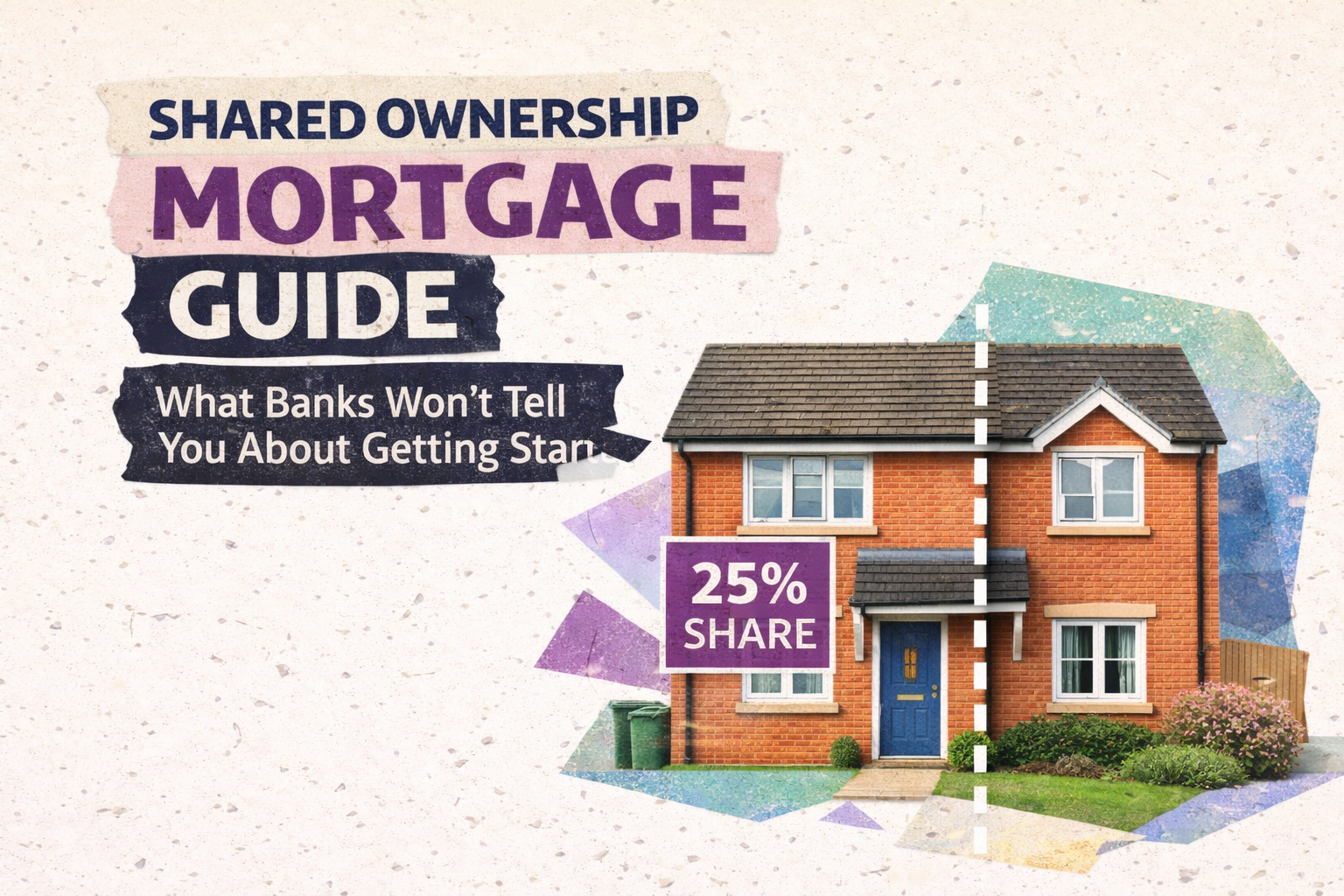Guarantor Mortgages: Your Complete Guide to Maximum Borrowing Power

First-Time Buyer? Here’s How Much Mortgage You Could Really Borrow

Shared Ownership Mortgage Guide: What Banks Won’t Tell You About Getting Started

How to Get a Mortgage in 2026: A First-Time Buyer’s Essential Guide

House Buying Fees: The Hidden Costs That Shock First-Time Buyers

House Buying Fees: The Hidden Costs That Shock First-Time Buyers
House buying fees can catch even well-prepared first-time buyers off guard. Recent research shows these unexpected costs might reach £30,000 in some cases. The property price serves as just the beginning at the time you budget for your dream home.
Legal fees cost between £850 and £1,500 for a £250,000 property. The Stamp Duty Land Tax adds another £15,000 to £30,000 for a £300,000 home. On top of that, you’ll need to cover mortgage arrangement fees, home insurance that averages £163.83 yearly, and several moving expenses. These hidden costs pile up quickly.
This piece outlines the most important fees you’ll encounter during your home-buying trip. A clear understanding of these costs helps you prepare your finances better. Many first-time buyers get caught off guard, but you can avoid this unpleasant surprise with proper planning.
Stamp Duty and Land Taxes
Stamp Duty hits many homebuyers hard as one of the biggest hidden costs when buying a house in England and Northern Ireland. Many first-time buyers don’t see this coming. A good grasp of this tax before you start house hunting can save you from a nasty surprise at the end.
What is Stamp Duty?
Stamp Duty Land Tax (SDLT) is a tax you pay to the government when you buy property or land above certain price points in England and Northern Ireland. This applies to freehold property, new or existing leasehold, and property through shared ownership schemes. You’ll need to pay whether you buy with cash or take out a mortgage.
Property buyers in Scotland pay Land and Buildings Transaction Tax, while those in Wales deal with Land Transaction Tax. These work in much the same way but come with their own rates and thresholds.
The rules say you must file your SDLT return and pay within 14 days after completion. Miss this deadline and you’ll face penalties and interest.
Rates for first-time buyers vs. others
Standard buyers will pay these SDLT rates from April 2025:
- 0% on property value up to £125,000
- 2% on the portion between £125,001 and £250,000
- 5% on the portion between £250,001 and £925,000
- 10% on the portion between £925,001 and £1.5 million
- 12% on any portion above £1.5 million
First-time buyers get a better deal. Your rates look like this:
- 0% SDLT up to £300,000
- 5% on the portion between £300,001 and £500,000
This special rate can save you up to £5,000 in buying fees. The catch? Houses worth more than £500,000 don’t qualify, and you’ll pay standard rates instead.
You count as a first-time buyer only if you’ve never owned property anywhere in the world – that includes inherited homes. Plus, if you’re buying with someone else, they must also be first-time buyers to get this deal.
Let’s break down a real example. A standard buyer purchasing a £295,000 property would pay:
- £0 on the first £125,000 (0%)
- £2,500 on the next £125,000 (2%)
- £2,250 on the final £45,000 (5%)
- Total SDLT: £4,750
A first-time buyer wouldn’t pay anything for the same property – that’s £4,750 saved right there.
Additional charges for second homes or overseas buyers
Buying an extra home worth £40,000 or more? The tax gets steeper. From April 2025, you’ll pay 5% extra on top of standard rates if you already own another property worth £40,000 or more. This covers second homes, buy-to-let properties, and holiday homes.
Buyers from outside the UK pay 2% more since April 2021. This comes on top of all other SDLT rates, including those higher rates for additional properties. The UK resident status needs you to spend at least 183 days here during any continuous 365-day period.
This means overseas buyers getting second homes might pay up to 17% SDLT on property portions above £1.5 million. The good news? Couples where one partner lives in the UK don’t need to pay the non-UK resident charge.
These extra charges and taxes add up fast. Many buyers miss these costs when they plan their budget at first.
Legal and Conveyancing Fees
Legal fees make up much of the house buying costs, typically ranging from £850 to £2,000 including VAT. This covers the legal process of transferring property ownership from seller to buyer, known as conveyancing.
Conveyancer vs. solicitor: who to hire?
Your property transaction’s complexity should guide your choice between a conveyancer and solicitor. Licenced conveyancers focus only on property law but can’t handle complex legal issues. Solicitors have training in all areas of law and must belong to The Law Society UK, which makes them cost more.
Licenced conveyancers charge less than solicitors and are a great way to get value in simple transactions. Notwithstanding that, a solicitor’s broader legal expertise might be worth the extra cost if you expect complications during your purchase.
Both professionals must follow strict regulations and professional standards. They can handle everything in the process, from drawing up contracts to organising stamp duty payments and transferring funds for your new property.
Disbursements and search fees
You’ll need to pay “disbursements” on top of simple legal fees. These are costs your solicitor pays to third parties on your behalf. These hidden house buying costs will apply whatever legal professional you choose.
Common disbursements include:
- Local authority searches: £250-£450 (checking council records for planning permissions and development plans)
- Environmental searches: £30-£35 plus VAT (checking for flooding risks, subsidence, contamination)
- Water and drainage searches: £30-£40 plus VAT (confirming property connection to fresh water and sewers)
- Bankruptcy searches: £2-£4 per person (verifying no bankruptcy issues)
- ID and anti-money laundering checks: £6-£20
- Bank transfer fee: £20-£45 plus VAT (for transferring funds to the seller)
These costs apply even with “no sale, no fee” agreements. You can’t avoid these extra house buying costs.
Land registry and transfer charges
The Land Registry keeps the official record of property ownership in England and Wales and charges fees to update these records. Your property’s value and application method determine these fees.
Land Registry fees for property purchases follow Scale 1 rates. A £250,000 property costs about £150 for electronic submission or £330 for postal submission. Online applications save you money – about 55% compared to postal applications.
The fee structure for a standard transfer of property is:
| Property Value | Online Fee | Postal Fee |
|---|---|---|
| £0-£80,000 | £20 | £45 |
| £80,001-£100,000 | £40 | £95 |
| £100,001-£200,000 | £100 | £230 |
| £200,001-£500,000 | £150 | £330 |
| £500,001-£1,000,000 | £295 | £655 |
| £1,000,001+ | £500 | £1,105 |
Transfer charges include official copies of title deeds (about £7) and possible ownership transfer fees (£200-£300).
Note that leasehold properties come with extra costs. These include notice of transfer fees (£50-£150 plus VAT per notice) and deed of covenant fees (£150-£250 plus VAT).
Mortgage-Related Costs
Many first-time buyers don’t realise that mortgage costs make up much of their house-buying fees. Your deposit and monthly repayments aren’t the only expenses – one-time charges can add thousands to your original costs.
Arrangement and booking fees
Lenders charge arrangement fees (sometimes called administration or product fees) to set up your mortgage. These fees usually range from £1,000 to £2,000. Your lender’s more attractive interest rates often come with these fees, which creates a balance between upfront costs and long-term payments. Smart buyers look at both rates and fees to get the full picture of their costs.
Some lenders also charge separate booking fees (or reservation fees) during mortgage application. These fees typically cost between £100 and £300. You won’t get your booking fees back if your purchase falls through, unlike arrangement fees.
Valuation and broker charges
Lenders need to value the property before they approve your mortgage. This ensures it provides enough security for their loan. Some lenders offer free valuations, while others base their charges on the property’s value. Fees range from £250 for properties under £150,000 to over £1,000 for properties worth more than £1 million.
Valuation fees across the UK vary quite a bit:
- Properties up to £150,000: approximately £250
- £200,001-£250,000: approximately £315
- £300,001-£400,000: approximately £430
Mortgage brokers help direct you through the complex mortgage market. Their expertise and access to exclusive deals could save you money. Brokers earn commission from lenders (around 0.35% of the loan amount), but some charge extra client fees. These additional charges come in different forms:
- Fixed fees (averaging £500)
- Percentage-based fees (0.35%-1% of the mortgage amount)
- Hourly rates
Many brokers now offer fee-free services and rely only on lender commissions.
Adding fees to your mortgage: pros and cons
You have two choices with mortgage-related costs: pay now or add them to your mortgage. Adding fees keeps more cash in your pocket now but increases your total borrowed amount.
Interest charges throughout your mortgage term become the biggest drawback of adding fees. A £999 arrangement fee added to your mortgage could cost a lot more due to compound interest over 25 years.
Paying fees upfront comes with its own risk – you might lose them if your purchase doesn’t go through. A smart approach adds the fee to your mortgage first for protection, then makes an overpayment equal to the fee after completion. Most lenders let you overpay up to 10% of your mortgage balance yearly without penalty.
Your decision should weigh immediate affordability against long-term costs. Adding fees to your mortgage might make sense if money is tight during the buying process, even with the extra cost over time.
Moving Day and Setup Expenses
Moving costs add up quickly after paperwork completion. First-time buyers often miss these expenses while calculating their total house buying costs.
Removals and van hire
Your belongings’ transportation costs depend on whether you do it yourself or hire professionals. A self-drive van rental costs between £55-£170 per day based on the vehicle size. Professional removal services charge £400-£1,400 according to property size. Moving a three-bedroom house costs approximately £800. A man and van service charges £36-£120 per hour.
Packing materials and insurance
Your budget should include packing supplies. You’ll need boxes, bubble wrap, tape, and protective wrapping for delicate items. Most removal companies provide packing services for an extra fee.
Good insurance coverage during your move is crucial. Most home contents policies cover removals, but they have limitations. Insurance companies only cover items moved by professional removal firms, not DIY moves. Your fragile items must be professionally packed to qualify for coverage. Additional removal insurance costs about 10% of your total removal fee if your current policy lacks adequate coverage.
Utility setup and council tax
Your new property needs utility services set up. Reading metres right after moving prevents charges for previous residents’ usage. The property’s current supplier will put you on a standard variable tariff until you switch providers.
The local authority needs your council tax registration immediately after moving in. They will evaluate your property and show you payment options. Council tax payments start the day you move in.
Temporary accommodation if needed
Different move-out and move-in dates might require temporary housing. You can choose short-term rentals through Airbnb, extended-stay hotels, or corporate housing. A good plan separates daily essentials from items that can go to storage. A 50 square foot storage unit costs around £22 per week.
Post-Move Hidden Costs
Buying a house can hit your wallet hard long after you get the keys, and many new homeowners don’t see the big expenses coming their way.
Emergency repairs and maintenance
New homeowners often face unexpected repair bills right after moving in. When critical issues threaten people’s safety or could damage the property severely, they need immediate attention. These emergencies range from gas leaks and electrical problems to burst pipes and sewage backups. Every homeowner should set up an emergency fund since even brand new houses might need urgent fixes.
Furnishing your new home
Hidden costs pile up fast when it comes to furniture. Research shows first-time buyers spend around £15,509 on average to decorate and furnish their new homes. Some buyers shell out more than £30,000 to make their space feel like home. Many first-time homeowners end up living with half-empty rooms for months because they can’t afford to furnish everything at once.
Waste disposal and skip hire
Home renovations create lots of waste. Skip rental costs vary between £125-£320 per week based on the container size. Small 2-3 yard skips start at £125 weekly, while larger 6-8 yard builder skips cost about £320. You’ll need to pay extra for permits – between £15-£60 if you place the skip on public land.
Shared space fees and service charges
Property ownership comes with ongoing costs. Homeowners on private estates must pay management fees that cover shared gardens, walkways, and open areas. These “fleecehold” charges now apply to roughly one million new homes across 20,000 housing estates. Leasehold property owners face both service charges and possible ground rent payments.
Conclusion
Buying your first home involves much more than saving for a deposit and paying monthly mortgages. First-time buyers often get shocked by many hidden costs we’ve discovered. Stamp Duty can reach thousands of pounds, while legal fees range between £850-£2,000. These expenses add up fast beyond the property’s price tag.
Your initial costs will include mortgage arrangement fees, valuation charges, and broker fees. Moving day brings its own set of expenses – you’ll need removal services, packing materials, and insurance. The spending doesn’t stop after getting the keys. Emergency repairs, furniture, and service charges will continue to drain your budget.
The total hidden costs of buying a house can hit £30,000 in some cases. This number would surprise even the most money-savvy first-time buyer. A complete budget plan before starting your property search becomes crucial.
Look beyond just the deposit and mortgage payments. Calculate all possible expenses to avoid any nasty financial surprises that catch many buyers unprepared. Building an emergency fund for unexpected property costs will give you peace of mind as you become a homeowner.
These costs might look scary at first glance. Good preparation makes everything easier to handle. Understanding and planning for these expenses helps you direct your house-buying trip with confidence and financial security. Your dream home should bring happiness, not money worries – this comes from smart planning and realistic budgeting.
Key Takeaways
Hidden house buying costs can reach nearly £30,000, far exceeding what most first-time buyers anticipate when budgeting for their dream home.
• First-time buyers save up to £5,000 on Stamp Duty with 0% tax on properties up to £300,000, compared to standard rates starting at £125,000 • Legal and conveyancing fees range £850-£2,000, plus unavoidable disbursements like searches (£250-£450) that apply even with “no sale, no fee” agreements • Mortgage arrangement fees typically cost £1,000-£2,000, which can be added to your loan but will accrue interest over the entire mortgage term • Post-purchase expenses average £15,509 for furnishing alone, with emergency repairs and ongoing service charges creating additional financial pressure • Budget comprehensively beyond deposit and monthly payments—create an emergency fund specifically for unexpected property-related expenses to avoid financial shock
The key to successful homeownership lies in thorough financial preparation. Understanding these costs upfront transforms potentially overwhelming expenses into manageable budget items, ensuring your dream home brings joy rather than financial stress.
First Time Buyer Tips: Hidden Mortgage Mistakes That Could Cost You Thousands

First Time Buyer Tips: Hidden Mortgage Mistakes That Could Cost You Thousands
Your first home purchase should spark joy, but poor planning could lead to costly mortgage mistakes that drain thousands from your wallet. An unrealistic budget substantially increases your risk of losing your home and leaves you struggling with basic expenses. A minor drop in your credit score might be the difference between getting approved or denied for a mortgage.
Most advice for first-time buyers centers on down payments, but homeownership costs go way beyond the original expenses. The experts suggest you build an emergency fund worth 10% of your home’s price to handle unexpected costs. Smart comparison of mortgage rates, terms and lender fees can save you money on your purchase. The stack of bills that keeps coming after you buy your home might catch you off guard if you’re not ready.
This piece reveals common mistakes new buyers make during their mortgage journey and offers practical tips to direct your property purchase with confidence.
Not getting a mortgage in principle first
One big mistake first-time buyers make is looking for houses without getting a mortgage in principle first. This can waste time, lead to disappointment, and you might lose your dream home to buyers who came better prepared.
Not getting a mortgage in principle first
A mortgage in principle (also called an Agreement in Principle, Decision in Principle, or mortgage promise) is a document from a lender that shows how much they might lend you based on simple information about your finances. While it’s not a guaranteed approval like a full mortgage offer, it’s a crucial first step in your home-buying experience.
Why an AIP matters to sellers
Estate agents and sellers see your AIP as proof that you’re a serious buyer. Surveys show that all but one of these buyers agree that having a mortgage in principle makes them more appealing to sellers. On top of that, 58% of buyers think getting a mortgage in principle before house hunting is very important.
The current competitive property market means an AIP gives you a real edge over other potential buyers. Estate agents give priority viewings to people who can prove they’re financially ready. Some areas—especially those in high demand—won’t even let you view a property without an AIP.
Sellers naturally prefer buyers who look more financially prepared when they have multiple offers. Your AIP shows you’ve taken real steps to arrange financing, which could be the deciding factor when a seller chooses between similar offers.
How to get one quickly
Getting an AIP is simple. The process takes about 10 minutes online, and you’ll usually get an instant decision. You’ll hear back by the next day if you apply outside business hours.
You’ll just need to provide:
- Your personal details and address history (usually for the last 3 years)
- Your income details, including salary, bonuses, and other earnings
- Your monthly expenses and existing debts
- Your National Insurance number
Most lenders run a “soft” credit check that doesn’t affect your credit score. This lets you explore your borrowing options safely without hurting your credit history.
What happens if it expires
AIPs stay valid between 60 and 90 days, depending on your lender. This gives you enough time to look for properties and make offers confidently.
Don’t worry if your AIP expires before you find a property or get an offer accepted. You can get a new one or renew it easily. A renewal won’t hurt your credit score.
It’s worth mentioning that you should update your information if your finances have changed since your original application—maybe due to a new job, pay rise, or more debt. Even good changes like a better credit score or less debt could help you borrow more.
Note that while an AIP isn’t legally binding, it shows you’re ready to buy. Getting one early in your house-hunting experience makes you look like a prepared and credible buyer.
Setting an unrealistic budget
First-time homebuyers often focus only on saving a deposit. They soon find that buying a property comes with many more costs. Getting the full picture of finances helps buyers avoid budget problems that could lead to money troubles.
Setting an unrealistic budget
Costs beyond the deposit
The deposit is the most important upfront payment—usually 5% to 20% of the purchase price—but it’s just the start of your financial commitment. You’ll need to budget for several big expenses.
Mortgage costs add up fast and often surprise first-time buyers. You’ll pay booking fees (about £100), arrangement fees (£500-£2,000+), and mortgage valuation surveys (£150-£800). On top of that, it costs around £2,000 including VAT for legal and conveyancing fees, plus £250-£300 for local searches.
Property surveys are another must-have expense. These cost between £400 and £1,500 based on how detailed you need them to be. Many first-time buyers don’t think about stamp duty. Even with relief on properties up to £300,000, it can add thousands to your costs.
Once you complete the purchase, you’ll need insurance right away. Combined buildings and contents coverage costs £375 per year on average. You must also plan for moving costs, home improvements, and regular bills like council tax, utilities, and service charges.
Emergency fund importance
New homeowners need an emergency fund. Financial experts say you should save enough to cover three to six months of simple living expenses.
A good emergency fund helps in several ways. We focused on making sure you can pay your mortgage if you lose your job or face health issues. Without these savings, you risk losing your home and damaging your credit score for years.
Homeowners must pay for all repairs and maintenance themselves. Big unexpected problems—like broken heating in winter or roof leaks—need quick fixes and cost a lot. Your emergency fund helps you avoid expensive debt when these problems show up.
How to calculate true affordability
Look past simple deposit math to know what you can afford. Lenders start with income multiples, usually offering 4-4.5 times your salary. This can range from 3 to 6 times depending on your situation.
Lenders have moved beyond simple income calculations. They look at your debt-to-income ratio and want to see 20-30% for the best rates. They inspect your monthly spending, especially existing debts like credit cards, personal loans, and car payments.
Monthly costs like phone contracts, streaming services, and gym memberships affect what you can borrow. Your spending habits, especially gambling, can worry potential lenders.
Financial experts suggest saving an extra 10-15% of the property’s price beyond your deposit. This extra money gives you peace of mind and makes moving into your new home easier. It protects you from surprise costs that could make your home-buying experience difficult.
Applying for credit before completion
Your credit behavior can put your home purchase at risk even after getting mortgage approval. Many first-time buyers don’t realize what it all means when they apply for new credit during this period.
Applying for credit before completion
How credit checks affect your score
Mortgage lenders use two types of credit checks during your application process. The original check is a “soft” credit check when they provide a mortgage in principle – this won’t affect your credit score. Later, when you submit a formal application, lenders run a “hard” credit check that stays visible on your credit report for 12 months.
Each hard check drops your credit score by several points. The good news is that most credit scoring systems treat multiple mortgage searches within 14 days as one search. You can compare mortgage deals without worrying about extra damage to your credit score.
Remember that many credit applications in a short time can make you look financially desperate or too dependent on borrowing. Financial experts suggest you should avoid new credit applications six months before your mortgage application.
Why lenders may withdraw offers
Lenders might pull their offer before completion for several reasons. We checked and found they run extra credit checks before exchange and completion that could show recent credit problems. These checks might reveal:
- Credit applications or borrowing you didn’t mention before
- Recent missed payments on your current credit
- Your credit score suddenly dropping
- Changes in your income that affect your regular payments
Lenders can immediately cancel their offer if they find hidden information or spot suspicious activity. Any change that doesn’t fit their lending criteria could lead them to withdraw the offer.
A withdrawn mortgage offer can throw your entire property purchase into chaos. Your financial stability throughout this process is vital.
Tips to protect your credit profile
Here’s how to protect your mortgage offer until completion:
- Freeze all new credit applications until you’ve completed your property purchase. This means no credit cards, phone contracts, monthly car insurance, or buy-now-pay-later deals.
- Make all payments on time for your existing credit. Direct debits are a great way to avoid missed payments.
- Keep your lender informed about changes in your situation, like losing your job or income changes.
- Be completely honest with your application. Give accurate information and tell your lender about any changes.
- Monitor your credit report regularly to spot errors or issues. Free services let you check without hurting your score.
- Maintain low credit utilization where you can. Try to keep balances at 25% or less of your credit limit.
- Stay registered on the electoral roll to help confirm your identity and address.
Managing your credit profile carefully during this vital period will reduce your risk by a lot. You’ll be much closer to completing your first home purchase successfully.
Skipping property surveys
Many first-time buyers skip property surveys to save money. This decision often leads to regret and can get pricey. Research reveals that almost half of buyers who skip a professional survey need major repairs within their first year of ownership.
What surveys reveal
Professional house surveys uncover hidden problems that buyers miss during typical viewings. Legal & General Surveying Services data shows the most common overlooked issues: damp (22%), asbestos (18%), and unauthorized building alterations (12%). These issues affect both health and finances. The NHS spends about £1.4 billion each year to treat illnesses linked to cold or damp housing.
Buyers who found repair needs after moving faced substantial costs. About 49% paid over £3,000 for repairs, while 15% dealt with bills exceeding £10,000. The survey cost seems like a bargain when you look at these numbers.
Types of surveys and when to use them
Three main survey levels are available today:
RICS Home Survey Level 1 (previously Condition Report): This simple survey works best for newer, conventional properties in good condition. It provides a ‘traffic light’ rating system but lacks advice or valuation.
RICS Home Survey Level 2 (previously HomeBuyer Report): This option suits conventional properties in reasonable condition. It offers more detailed information than Level 1 and recommends further investigations.
RICS Home Survey Level 3 (previously Building Survey): This detailed option suits properties over 50 years old, unusual designs, listed buildings, or homes in poor condition.
Survey prices range from £300 to £1,500 based on type and property value.
How survey results can save you money
Survey results often lead to successful price negotiations. About 35% of homebuyers who get a survey manage to reduce the purchase price. Major issues found during surveys give you options. You can ask sellers to fix problems before purchase or negotiate a lower price based on repair costs.
Rising damp repairs cost around £2,750, while asbestos removal runs about £1,750 per square metre. Finding these issues early helps you make smart decisions about the purchase and negotiate better terms based on expected repair costs.
Overlooking buildings insurance and other protections
Insurance protection is a vital yet often overlooked part of buying your first home. You need to know what insurance you need and exactly when you need it. This knowledge could save you from major financial troubles down the road.
When insurance becomes your responsibility
A common mistake among first-time buyers is thinking insurance matters only after moving in. The truth is you become legally responsible for your new property at exchange of contracts, not completion. This difference is significant—any disaster between exchange and completion still leaves you legally bound to buy the property.
Your mortgage lender will need buildings insurance ready by the time contracts are exchanged. Missing this requirement could derail your mortgage and the whole purchase chain might collapse.
What buildings insurance covers
Buildings insurance safeguards your home’s physical structure—the walls, roof, and floors—along with permanent fixtures like kitchen units and bathrooms. Your coverage extends to external structures such as garages, sheds, and fences.
This insurance typically protects against damage from:
- Fire, floods, and storms
- Subsidence
- Burst pipes
- Fallen trees or lampposts
Most policies won’t cover damage from wear and tear, poor maintenance, or certain pests.
Other useful insurances to think over
Buildings insurance isn’t the only protection you’ll need. Here are other important options:
Life insurance gives you peace of mind that your family can keep up with mortgage payments if something happens to you. Your personal circumstances and remaining mortgage amount help determine the right coverage.
Income protection helps you financially if you can’t work due to accident or injury. This support helps you keep up with mortgage payments.
Critical illness cover pays a lump sum if you’re diagnosed with specific conditions. This money could clear your mortgage or pay for rehabilitation.
An adviser can help you make smart insurance choices based on your unique situation.
Conclusion
Buying your first home is an exciting milestone, but hidden pitfalls can catch you off guard. You need to understand these mortgage mistakes to protect your financial future. A mortgage in principle shows sellers you mean business and gives you an edge in the property market. Your budget needs to cover more than just the deposit – think legal fees, surveys, and emergency funds.
Keep a close eye on your credit profile while buying a home. Lenders can pull their offers if they spot new credit applications or money problems before completion. Property surveys might seem expensive upfront but they’re worth it. They can save you thousands by spotting hidden issues like damp, asbestos, or structural problems that could become your headache later.
Buildings insurance needs to start from the exchange of contracts, not completion – a detail many first-time buyers miss. This coverage, along with life insurance and income protection, shields your investment from unexpected problems.
The road to homeownership has its challenges, but good preparation reduces financial risks. This knowledge helps you tackle your first property purchase with confidence and avoid mistakes that could turn your dream home into a money pit. Remember, your choices during this process will shape your financial health for years ahead.
How to Get a Mortgage: A First-Time Buyer’s Guide for 2025 (Step-by-Step)

You’ll need at least a 5% deposit of the property price to apply for most first-time buyer mortgages.
Buying your first home and dealing with mortgages can feel overwhelming. The process becomes a lot less stressful once you understand the basic steps to get a mortgage. You’ll need to complete several important stages, but the mortgage process follows a logical order.
Getting your finances sorted is just the start. The process needs specific knowledge and preparation at every step. You’ll move from getting an agreement in principle to finding the right property. Making an offer comes next, followed by completing all legal requirements.
This piece breaks down exactly how to get a mortgage in 2025, with practical tips for first-time buyers. We’ll cover everything you need to know – from figuring out what you can afford to getting your house keys. Some lenders now provide 95% LTV mortgages without using the Government’s mortgage guarantee scheme.
Step 1: Check What You Can Afford
You need to know exactly what price range you can afford before looking at property listings. This first step is vital because it forms the base of your house-hunting trip.
Step 1: Check What You Can Afford
Use a mortgage calculator to estimate your budget
Mortgage calculators are great tools that help you understand your financial position before talking to lenders. These free online tools let you:
- See how much you might be able to borrow based on your income
- Calculate estimated monthly payments
- Test different deposit amounts to see how they affect your loan
Most major banks and building societies have mortgage calculators on their websites. These calculators give you a rough idea of your budget. The actual amount a lender will offer depends on many factors that go beyond what the calculator shows.
These tools help you try different scenarios before making formal applications. To cite an instance, see how saving for another six months could boost your borrowing power or how different interest rates change your monthly payments.
Understand how your income and deposit affect borrowing
Lenders usually won’t let you borrow more than 4.5 times your annual salary. In spite of that, many people get nowhere near this maximum amount, so keep your expectations in check.
Your deposit size makes a big difference to your mortgage options. You’ll need a deposit between 5% and 20% of the property’s purchase price. On a £300,000 property, a 5% deposit would be £15,000, while a 15% deposit would be £45,000.
A larger deposit offers clear benefits:
- Lower monthly repayments
- Better interest rates
- More equity in your home
- Improved loan-to-value ratio
- Greater chance of mortgage approval
Lenders also look at other financial commitments when calculating affordability, including credit cards, loans, and dependents. Cutting down current debts and large outgoings can help increase your borrowing potential.
Factor in monthly repayments and other costs
Monthly mortgage payments are just one part of buying a home’s financial commitment. Your repayments change based on:
- The loan amount
- The interest rate
- The term length
- Whether you choose a repayment or interest-only mortgage
A capital repayment mortgage means your monthly payments cover both the capital and interest. Most of your payment goes toward interest in the early years. As time passes, you’ll pay off more capital each month.
There are many extra costs to budget for that could add thousands of pounds to your house purchase. These include:
- Arrangement fees (typically around £1,000)
- Booking fees (£100-£250)
- Legal/conveyancing fees (£850-£1,500)
- Valuation fees (up to £300)
- Land registry and searches (£250-£300)
- Stamp duty (depends on property price – first-time buyers may get exemption or discount)
Budget calculators help you work out how much you can save monthly for these extra costs. Saving £100 per month adds up to £6,000 over five years.
Understanding these financial elements will give you a clear picture of what you can afford. This helps you look at properties in your price range and avoid financial stress later.
Step 2: Get a Mortgage Agreement in Principle
The next big step after figuring out what you can afford is getting a lender’s formal recognition through an Agreement in Principle (AIP). This document marks a key milestone as you work to secure a mortgage.
Step 2: Get a Mortgage Agreement in Principle
What is a Decision in Principle?
An Agreement in Principle (AIP) is a statement from a lender that indicates how much they might lend you based on their first look at your finances. You might hear it called different names like Mortgage in Principle (MIP), Decision in Principle (DIP), Mortgage Promise, or Approval in Principle. These terms all mean the same thing – a certificate showing how much a lender might offer you.
The AIP looks at your finances through a soft credit check that won’t affect your credit score. This is different from a full mortgage application that needs a complete analysis of your finances and uses a hard credit check.
Most AIPs last between 30 and 90 days, depending on the lender. You’ll have enough time to find a property while knowing roughly how much you can borrow. Just note that an AIP doesn’t guarantee you’ll get a mortgage offer when you submit your full application.
Why estate agents ask for it
Estate agents want to see an AIP for several good reasons. We checked that you’re a serious buyer who has already started the process to buy a property. Having an AIP can give you an edge when you’re competing with other buyers for the same property in today’s market.
More than that, an AIP boosts your credibility with estate agents and sellers. They take your offers more seriously once they know you’ve passed initial financial checks. Some places, especially in Scotland, won’t even let you view a property without an AIP.
The AIP helps you avoid disappointment by keeping you focused on homes you can actually afford. Your house-hunting experience becomes quicker as you’ll know exactly which properties line up with your budget.
How to apply for one
Getting an AIP is pretty simple. You can do it online, over the phone, or in person with a lender. The whole thing usually takes about 10 minutes.
You’ll need these things to apply:
- Your personal details, including name and date of birth
- Address history for the last three years
- Details of your income and monthly outgoings
- Information about your savings and existing debts
- Your National Insurance number
The lender will run a soft credit check and work out how much they might lend you. You should get an answer right away if you apply during business hours.
It’s smart to research and pick the lender you’d actually want your mortgage from before you start. Too many credit searches in a short time can affect your credit score. You might want to talk to a mortgage broker who can find deals that fit your situation.
An AIP isn’t mandatory but it’s a great way to get started with your mortgage. It helps you understand your budget and makes you look like a more serious buyer.
Step 3: Start House Hunting
Your mortgage trip really kicks off once you have your original budget and Agreement in Principle. Now comes the fun part – finding your dream home. You need a solid plan to find a property that fits your needs and budget.
Set your priorities and deal-breakers
A clear list of must-haves makes house hunting much easier. Pick your top 3-5 priorities and skip properties that don’t match these key points. Smart buyers focus on things they can’t easily change, such as:
- Location and neighbourhood
- Property size and number of bedrooms
- Garden or outdoor space
- Parking availability
- Structural condition
- Quality of major home systems (electrical, plumbing)
You can track this in a spreadsheet or just talk it through honestly. Ask yourself: “Would I buy an amazing house if it didn’t have this feature?” If the answer is no, put it on your non-negotiable list.
Be flexible with location or features
Note that location is the one thing you can never change. That’s why it tops almost everyone’s list, though it means something different to each buyer. Some care about schools, others about commute time, safety, or nearby amenities.
Therefore, you might want to be flexible with other features to get the right location. Many buyers find they can compromise on interior features to buy in their preferred area. You can renovate a small kitchen, but you can’t move a house away from a busy road.
This works both ways. If specific property features matter most to you, you might need to look at different neighbourhoods. First-time buyers often find great deals in up-and-coming areas just outside their ideal spot.
How to view properties effectively
You need a good strategy when viewing your shortlisted homes. Don’t let nice décor sway you. Here’s what to do:
Visit the property more than once at different times. This shows you how light, traffic, and noise change through the day. A quiet noon street might turn into a busy rush hour route.
Bring a detailed checklist that covers:
- Structural condition (look for large cracks in walls)
- Signs of damp or mould
- Condition of windows and doors
- Water pressure and heating systems
- Natural light levels
- Storage space
- Direction the garden faces (south-facing gets most sun)
Test everything – run taps, flush toilets, open windows, and check mobile signal strength. Take photos (ask first) to compare properties later, as they tend to blur together after several viewings.
The surrounding area matters too. Walk around at different times, check local amenities, and get a feel for the community. These things affect your daily life and stay the same after you buy.
Step 4: Make an Offer and Apply for a Mortgage
You’ve found your dream property! The next vital phase of your mortgage trip starts now. Let’s talk about making an offer and completing your full mortgage application. This stage needs good planning and preparation.
Step 4: Make an Offer and Apply for a Mortgage
How to make a strong offer
The property you love is within reach. Your next move is a compelling offer. Research similar property prices in your area to make sure your offer makes sense. Sellers love first-time buyers with no chain, especially when they want a quick sale.
Your Agreement in Principle should be ready along with your solicitor’s details. This shows sellers you mean business. The best strategy might be to put your strongest offer forward right away. Many experts say this helps avoid long negotiations.
The property should come off the market right after your offer gets accepted. This protects you from gazumping – when another buyer swoops in with a higher offer.
Choosing between a lender and a mortgage broker
A big decision awaits you: should you apply directly with a lender or work with a mortgage broker?
Mortgage brokers connect with lenders of all sizes to find great deals. Banks stick to their own products. Brokers often discover better rates that match your situation perfectly.
The support you get varies too. Brokers handle most paperwork and documentation, which speeds things up. Direct bank applications might work better if you’re already their customer.
Money matters differ here. Some brokers charge fees while others get paid by lenders. Banks give free mortgage advice but their rates might not be as competitive.
What documents you’ll need for the full application
Your formal mortgage application needs several key documents:
- Proof of ID: Passport or driving licence
- Proof of address: Recent utility bills, council tax bills or bank statements
- Evidence of deposit source: Bank statements showing savings or a gift letter from anyone helping you
- Proof of income: Latest payslips and bank statements
- Proof of expenses: Documentation of financial commitments
Self-employed? You’ll need extra paperwork. This includes two years of accounts, SA302 forms, tax year overviews from HMRC, and business bank statements.
Getting these documents ready early makes your application move faster and smoother.
Step 5: Legal Checks and Final Steps
The last part of your mortgage trip involves crucial legal processes and checks to protect your investment. You need to understand these steps to transition smoothly into homeownership.
What conveyancing involves
Conveyancing transfers property ownership from seller to buyer legally. The process starts once the seller accepts your offer and continues past completion. Most buyers work with a legal professional—a solicitor, licenced conveyancer, or chartered legal executive—though you could handle it yourself.
Your conveyancer will:
- Complete ID and anti-money laundering checks
- Get into the draught contract and ask questions
- Run property searches and title investigations
- Handle payments and register the property in your name
Types of property surveys and why they matter
A property survey differs from the lender’s mortgage valuation. Surveys aren’t legally required, but they spot potential risks that could affect your decision or help you negotiate the price.
The main survey types include:
- RICS Home Survey Level 1: Simple overview suitable for modern properties in good condition (£300-£900)
- RICS Home Survey Level 2: Standard choice that looks at condition and highlights issues like damp (£400-£1,000)
- RICS Home Survey Level 3: Complete analysis suited for older or unusual properties (£630-£1,500)
Receiving your official mortgage offer
Your lender will send an official mortgage offer to you and your solicitor after processing your application. You must have buildings insurance ready before the exchange. The solicitor reviews all conditions and asks you to sign and return the offer.
Exchanging contracts and completing the sale
Contract exchange makes your purchase legally binding. Solicitors read out contracts over the phone to ensure they match. You’ll pay your deposit (usually 10%) at this stage.
You’ll have 7-28 days between exchange and completion to prepare for the move. Your solicitor transfers the remaining funds on completion day, and once the seller receives them, you’ll get the keys to your new home.
Conclusion
Getting your first mortgage needs careful planning and patience. The process becomes easier when you break it down into simple steps. This piece shows you how to check what you can afford, get an Agreement in Principle, look for properties, make strong offers, and handle the final legal work.
The mortgage process can feel overwhelming for first-time buyers. A clear understanding of each stage takes away much of the confusion and worry. Your financial groundwork is crucial for a successful application. A good deposit, managed debts, and a budget for extra costs will boost your chances by a lot.
Note that staying flexible helps when you’re looking for a property. You might need to compromise to find the right mix of location and features. This mindset creates realistic expectations and better buying decisions. A detailed property inspection also helps you avoid costly surprises after you move in.
Professional help is a great way to get through this process. A mortgage broker can find you competitive rates, while a solicitor handles the legal work. Expert guidance helps you dodge common mistakes and speeds up the whole ordeal.
Understanding mortgage terms and requirements before you start your search saves you from headaches later. This knowledge lets you tackle each step with confidence. You can ask the right questions and make smart choices about what’s likely to be your life’s biggest financial decision.
The road to owning a home might look scary at first. Each step you complete brings you closer to getting your new home’s keys. Your hard work pays off with more than just a property – it gives you the security and joy of owning your first home.
Key Takeaways
Getting your first mortgage in 2025 requires systematic preparation and understanding of each crucial step in the home-buying process.
• Budget realistically with a 5% minimum deposit – Use mortgage calculators and factor in hidden costs like legal fees, surveys, and stamp duty beyond your monthly repayments.
• Secure an Agreement in Principle before house hunting – This demonstrates you’re a serious buyer and strengthens your position when making offers on competitive properties.
• Prioritise location over changeable features – Focus on 3-5 non-negotiable requirements and remain flexible on aspects like décor or kitchen size that can be renovated later.
• Prepare comprehensive documentation early – Having proof of income, deposit source, and expenses ready speeds up your full mortgage application significantly.
• Invest in professional property surveys – Beyond the lender’s basic valuation, surveys identify potential issues that could affect your purchase decision or negotiating position.
The mortgage process follows a logical sequence from affordability assessment to completion, but thorough preparation at each stage protects you from costly surprises and strengthens your position as a first-time buyer in today’s competitive market.
First Mortgage – How to Get Your First Mortgage UK

Are you considering buying your first home? Navigating the process of getting your first mortgage can feel overwhelming, with statistics showing close to 50% of first-time buyers make two or more offers before being accepted.
Careful planning and knowing what to expect can make the process less stressful and give you the best possible chance of success.
This guide presents everything you need to know about how to get your first mortgage in the UK to help you get started on the property ladder.
What is A First Time Buyer’s Mortgage?
First-time buyer mortgages are designed for people looking to buy a home for the first time. You’re generally considered a first-time buyer if you’ve never owned a property anywhere worldwide, meaning you must not have owned your home or a buy-to-let property, with or without a mortgage.
Lenders will not consider you a first-time buyer if you’ve inherited a home, even if you never lived there. You’ll also be excluded if you’re buying a property with someone who owns or previously owned a house or a guardian or parent who already owns a property is purchasing the home for you.
Commercial properties don’t count, so you’ll still qualify as a first-time buyer when buying a home if you own or have owned an office, workshop, shop, or warehouse.
How Can You Get Your First Mortgage in the UK?
The process of getting your first mortgage involves several stages. These include
Step 1: Determining How Much You Can Borrow
Find out how much you can borrow by looking at your income, regular spending, and any debts. Many providers allow you to borrow 4 to 4.5 times your income, provided you meet their affordability criteria, which usually considers your debt-to-income ratio.
Other factors that can affect how much lenders are willing to lend to you include your credit score, savings, monthly outgoings, and type of employment or profession.
Step 2: Save A Deposit
The deposit is the amount you put down as part of the property’s purchase price, and it will affect how much of a mortgage loan you’ll need. You’ll need a minimum deposit of 5% of the property’s price among most lenders.
A high deposit will make accessing the best deals with lower rates easier. A lower deposit will make you look riskier since the mortgage will cover more of the property’s total price.
Step 3: Get A Decision in Principle
After working out how much you can borrow and saving the deposit, get a decision in principle (DIP) and start looking at properties. A DIP is also called an agreement in principle. It gives you an idea of the type of property you could purchase, but it’s not a guaranteed mortgage offer.
The DIP involves looking at your income and performing a soft credit check. It lasts 30 to 90 days and helps show sellers and agents that you’re a serious buyer. Most will only arrange viewing once you have a DIP.
Step 4: Make an Offer
Once you find a property you want to buy, make an offer to the seller. Compare the price to the cost of other houses for sale in the area and decide on the maximum amount you can pay using the decision in principle.
Step 5: Apply for a Mortgage
You can make a formal mortgage application once your offer has been accepted. The lender will review affordability by examining your income and outgoings and conducting a hard credit check. The lender can also perform a stress test to determine if you can keep up with mortgage payments if something changes in the future.
Keep all your documents handy when applying for a mortgage. These can include:
- Proof of ID
- Proof of address, like your utility bills
- Proof of income like payslips or bank statements from the last three to six months or 2-3 years of certified self-employment accounts
- Your P60 tax form
- Evidence of your deposit
Step 6: Valuation and Conveyancing
Most lenders will complete their valuation of the property you’re buying to ensure it’s worth the purchase price. It’s worth getting your surveyor to inspect and survey the property and identify any issues or defects that may cost you more later.
You’ll also need to find a conveyancer or solicitor who will ensure all the legalities of buying a house are met.
It can include contacting the seller’s solicitor and checking their documents, performing local authority and drainage searches of the property, and checking the mortgage offer.
Step 7: Contract Exchange and Completion
After getting the mortgage offer and completing the legal work, your solicitor will exchange the contract with the seller’s solicitor, pay your deposit, and agree on a completion date.
The solicitor will arrange for the funds to be transferred from the mortgage lender to the seller on the completion day, and then you’ll get the keys to your new home.
Can You Use a Government Scheme on Your First Mortgage?
Yes! The UK government offers various home ownership schemes to make getting onto the housing ladder easier. These include:
- Shared Ownership – The shared ownership scheme makes it easier to buy a home if you’re finding it challenging to save a deposit for a home that meets your needs. The share you can buy can range from 10% to 75% of the home’s market value. You’ll then pay rent on the remaining share.
- First Home’s Scheme – The first home’s scheme allows first-time buyers to buy a house for 30% or 50% less than its market value. The scheme is only available in England, and you can use it to buy newly built homes or a home someone else previously purchased through the scheme.
Final Thoughts
Getting your first mortgage can be smooth with the proper guidance and preparation.
Consulting a mortgage advisor or broker with knowledge and experience in arranging mortgages for first-time buyers can help take the pressure off and increase your chances of success with an affordable mortgage that’s right for you.
Call us today on 03330 90 60 30 or contact us to speak to one of our friendly advisors.
Sources and References
- https://www.statista.com/statistics/1250285/first-time-buyer-mortgage-experience-uk/
What Will Replace Help to Buy?

Statistics featured by Statista show us that when Covid 19 struck, home buyer levels plummeted to below 2016 levels, spurring on the government to introduce schemes like the Help to Buy scheme.
One of the biggest perks of the Help to Buy mortgage scheme is that first-time buyers only needed to accrue a 5% deposit. The government would provide an equity loan to the value of 20% of the purchase price.
The mortgage was interest-free for five years, and the mortgage provided, thanks to the government contribution, was 75% of the property value.
According to the UK government, Help to Buy mortgage schemes were introduced in 2021. A short-lived success, the scheme was closed to new applications on 31 October 2022.
Transactions part of the scheme were meant to be finalised by 31 March 2022, but some homebuilders were allowed to extend until 31 May 2023 to make it easier for buyers to complete the purchasing process.
Now that the Help to Buy scheme is discontinued, people hoping to get assistance in buying a UK home may wonder what their options are.
What are the alternatives to the Help to Buy scheme in the UK?
Alternatives to the Help to Buy Scheme
There is no official government alternative to the Help to Buy mortgage scheme, but several options can serve as viable alternatives to the scheme.
Some of the options you can consider, include the following:
- Deposit Unlock
Deposit Unlock is very similar to the Buy to Let scheme in that it focuses on funding the purchase of a new build with a 5% deposit as opposed to the usual 20% requirement.
With this scheme, the builder will insure the mortgage, which leads to the lender seeing the transaction as less risky when providing a 95% mortgage.
- Deposit Boost
If you’re renting a property and paying high bills thanks to the cost-of-living crisis, it wouldn’t be surprising that saving a hefty deposit for purchasing a home can be challenging.
If you’re in the process of saving a deposit and have family and friends who may be interested in helping you, a deposit boost could be the answer.
Deposit Boost mortgages are unlike guarantor mortgages. With a guarantor mortgage, the guarantor is linked to your loan, which means if you don’t pay, they become liable.
On the contrary, Deposit Boost options, the person assisting you can remortgage their property to release some equity for your deposit. If you default on your mortgage, it won’t have an impact on that person whatsoever.
- Professional Mortgage
If you’re a doctor, accountant, lawyer, or nurse, the lender may consider you for a professional mortgage.
This type of mortgage allows the application to borrow around 5 or 6 times their salary and pay the lowest possible deposit of 5% if buying a property that’s not a new build.
Only applicants who have qualified in the last 10 years are eligible for a professional mortgage and will need to prove that they are registered and licensed with the required professional bodies in the UK.
- Income Boost Mortgage
Income boost mortgages are like deposit boost options. They increase buying potential by making it possible for a family member or friend to add their income to yours when making the mortgage application.
This makes it similar to a joint mortgage, too. As mortgage providers generally only allow mortgage totals of 4 or 5 times a person’s salary, adding an additional income to the application can make it possible to afford a home that better suits your needs.
One of the perks of this type of mortgage is that you can add more than one booster to the mortgage to increase your buying power.
- Springboard Mortgage
These mortgages are sometimes referred to as “Savings as Security” mortgages and are another way family members can help buyers purchase the property they want.
Instead of remortgaging their home or adding their income to your application, the springboard mortgage enables family members to use their savings as security on your application.
This is usually based on willing family members putting up a 10% percentage of the property’s value into a savings account held by the lender.
The money stays in the savings account for a set period, and as long as you make your regular monthly payments, the amount will be returned to them with interest, as you will then own a certain amount of equity in the property.
- Shared Ownership Mortgage
Buyers who can’t afford the mortgage they need to purchase a property can choose to buy a share in the property and pay rent on the amount they cannot afford.
Most homeowners can buy between 10% and 75% of the home’s value.
In such an instance, the balance of the property will be owned by the local council, a housing association, or a private company.
This entity will be the landlord and charge rent on the portion of the property that they own.
If you want to eventually own the entire property, you can choose to do something called “staircasing” which means you gradually increase your share in the property until you own it outright.
- Dynamic Ownership Mortgage
If you have a group of trusted friends or family members that would be willing to purchase property together, a dynamic ownership mortgage may be the right choice for you.
This type of mortgage allows the purchase of a property with up to 5 other people.
What’s great about this mortgage is that everyone contributes to paying the property off and individual contributions can be tracked.
If you ever choose to sell the property, your share will be determined by what portion of the property you paid off.
- Deposit Loan
You can boost your deposit with the help of a close family member or loved one. This person’s money is not a gift but a contribution in exchange for a share in the home.
Of course, if you don’t want to give the person a share in your property, you could look for a close family member willing to give you an interest-free loan that can be repaid when the property is sold. You’ll both be considered co-owners.
What Will Replace Help to Buy? Conclusion
Each of these mortgage options would be a viable alternative to the Buy to Let scheme that is no longer available.
If you aren’t sure which option is best suited to your financial situation, it’s recommended to consult with a mortgage advisor who can give you unbiased and sound advice based on your situation and how viable each mortgage option is.
Call us today on 03330 90 60 30 or contact us to speak to one of our friendly advisors.
Should You Buy A Fixer Upper For Your First Home?

Saving to buy a house can be challenging for many people, and a fixer-upper can be an enticing option.
Fixer-upper properties feature steeply-discounted prices, making them very affordable.
Renovating your own home can also be exciting, but it’s wise to have all the facts before taking the plunge.
Here are a few things to consider when deciding whether to buy a fixer-upper for your first home and how to get a fixer-upper mortgage.
What Is A Fixer-Upper?
A fixer-upper is simply a house that needs repairs before it’s comfortable or appealing.
These can vary from significant renovations like structural repairs or replacing walls, roofs, or floors to more straightforward and less extensive work like redecorating and painting.
You can buy a fixer-upper house for less than the market rate of similar homes in better conditions because of the extra costs and time required for upgrades on the property.
It can allow you to own your first home in your desired area at a lower price and even save money.
Are There Fixer Upper Mortgages?
Yes. Also called buy-to-renovate mortgages, fixer-upper mortgages are designed for borrowers who want to buy a property needing work.
They can vary depending on your needs and whether the house needs cosmetic refurbishments or substantial building work.
Fixer-upper mortgages differ from conventional ones as the lender will consider more than the property’s market price.
They’ll look at the estimated property value once the work is complete, and the amount you can borrow is usually based on the projected value instead of the current value.
As a result, you can borrow more than standard mortgages would allow with fixer-upper mortgages.
Buying A Fixer Upper Using A Conventional Mortgage
Based on your finances and the scale of work involved, you can choose to go for a conventional mortgage to cover the purchase only without renovation costs.
It’s an affordable way to get on the property ladder.
It’s suitable if you plan to renovate the house long-term, can afford it, and have building skills or financial and practical support from your family to help carry out the work.
This route allows you to apply for additional funding when buying or later when your financial position is more substantial, or the property’s value has increased.
Considerations When Buying A Fixer Upper
Property Condition
The ease of getting a fixer-upper mortgage will mainly depend on the condition of the property you want to buy.
The property may be unmortgageable if it’s unsuitable for living in, so ensure it has some basics to make it habitable, such as a kitchen, bathroom, and water access.
Lenders may not offer mortgages if the property is derelict, uninhabitable, or needs a conversion.
The lender will run extra checks than standard mortgages to ensure the work required isn’t too risky, so conduct your survey before applying to confirm lenders can approve it for a mortgage.
Unexpected Costs
Property development is never straightforward, and it can be challenging to keep costs within budget.
A renovation project can quickly surpass your budget, so ensure you have a good contingency for unexpected costs.
Set a realistic budget with an extra 20% or more for unforeseen issues that may spring up.
Planning Permission
If you’re working on a small renovation project, you can get cracking straight away under permitted development and don’t need planning approval.
However, if you need to make extensive changes or want to buy a listed building, you’ll need consent from the local authority.
Ensure you check how easy it is to get planning permission for the house, as it can be time-consuming and a positive result isn’t always guaranteed.
It can take up to 12 weeks for the council to decide and allow neighbours to have their say after submitting your application.
Your Skills
Assess your abilities in terms of actual DIY and project management. Will you manage the project or employ a project manager?
Think about how much work you or your family can take on and the practical expertise required, as it would be misguided to try and do things you’re not confident about.
Hiring an expert can ensure the work is done to the required specification.
Their experience can save you from unnecessary costs and delays, and you’ll not have to be on-site all the time.
Timeframe
Renovating a house can be lengthy and stressful.
Five years or more can quickly go by while still living on a building site so ensure you work out a realistic timeframe before committing.
A project can run longer than expected and strain your work and personal life.
Seek advice from experts with experience in fixer-upper houses and leave some wiggle room for unexpected jobs.
Don’t forget to factor in other demands on your time, like family, a busy job, and breaks from the project to relieve the pressure.
Types of Fixer Upper Mortgages
There’s no one size fits all fixer-upper mortgage since all renovations are different.
Available options include:
Construction Only Mortgage
It involves committing to an initial mortgage for the renovation, and once it’s finished, you apply for a second, standard mortgage that pays off and replaces the first.
Construction to Permanent Mortgage
It involves two stages agreed to from the beginning.
The initial stage consists of a mortgage for renovations, usually on interest-only terms, and after the renovations are complete, it reverts to a conventional mortgage.
Most lenders release funds for fixer-upper mortgages in stages as you work on the property and conduct interval inspections to check progress.
Others withhold part of the funds until renovations are complete and the property is valued.
Ensure you find out whether the mortgage offers payments in advance or arrears to determine whether you need to find a way to fund the project while waiting.
Should You Buy A Fixer Upper For Your First Home? Final Thoughts
Buying a fixer-upper can be an affordable way to get on the property ladder and live in a desired area, but it can come with plenty of hurdles.
Ensure you work with a mortgage advisor with expertise in fixer-upper mortgages to help you compare costs and rates across the entire market and guide you on suitable options.
Call us today on 03330 90 60 30 or contact us. One of our advisors can talk through all of your options with you.









